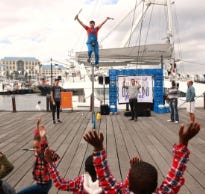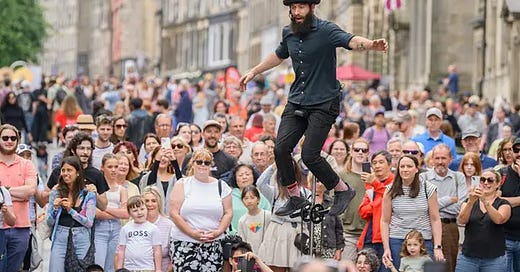Tony Lankester to run Edinburgh Fringe
Art imitates life as our man from Makhanda is appointed CEO of the original
The former CEO of South Africa’s very own National Arts Festival, Tony Lankester, takes over as Chief Executive Officer of the Edinburgh Fringe in April.
This is a clear reflection of the power shift that we see happening across so many spheres of life. There is no doubting that Africa is on the rise as the global north … well … sinks a bit. Don’t be surprised when the well-trodden path from Makhanda (once was Grahamstown) to Edinburgh becomes increasingly popular in reverse.
Speaking from London, Lankester said, “I’m going into the job in Edinburgh with the winds of Makhanda at my back. The National Arts Festival is what started my love affair with the arts world and I am forever grateful for the time I had there and what I learned about this industry. Being able to witness, first hand, the transformative power of the arts for performers and audiences and to be part of a city that, like Edinburgh, knows how to put on a great show are definitely things I will take with me into this new role.”

Lankester was at the helm of the NAF from 2007 to 2019, and has remained a board member since. He moves to Edinburgh from just down the road, in London, where he has been helping to steer Riverside Studios in Hammersmith through some tricky times in the last five years. As joint-CEO and Executive Director, he helped the iconic studio to navigate the pandemic, as well as a restructuring and a sale to a newly established trust.
In his 12 years at the NAF in Makhanda, Lankester helped to broaden the festival’s funding base, significantly increase its audience and deepen its role in the community.

He initiated and oversaw the launch of several new festivals – including the Cape Town Fringe and the Creativate Digital Arts Festival – and increased the global footprint of the festival by touring multiple productions to Fringe Festivals in Australia, the UK, the US and across Europe.
Lankester was also founding chair of the World Fringe Alliance, an informal grouping of 10 Fringe Festivals which has opened touring pathways for artists from across the globe. He project-managed the South African Pavilion at the Venice Biennale, marking the country’s return to the event in 2013.
Announcing his appointment on behalf of the Edinburgh Festival Fringe Society, Chair Benny Higgins said: “Tony brings a wealth of experience from his previous roles, and his insights from both a cultural and commercial background will ensure the Fringe Society can meet the needs of the wider Fringe community. As the Fringe builds towards its 80th anniversary year, Tony’s leadership will be key in ensuring the long-term sustainability of the Fringe Society and Edinburgh Festival Fringe.”
And how amazing to have a South African at the helm. As Sikkie Kajee, Chairman of the National Arts Festival Board, said: “We heartily congratulate Tony on his appointment as CEO of the Edinburgh Fringe. We feel encouraged that the diversity of his experience carries him into this new role as CEO of the founding Fringe festival champion, Edinburgh; a global movement that plays a critical role in driving new work and opportunities for artists on stages across the world.”
BACKSTORY: The Edinburgh Festival Fringe is a three-week festival of performing arts that takes place in Edinburgh every August. Its story dates back to 1947, when eight theatre groups turned up uninvited to perform at the Edinburgh International Festival, an initiative created to celebrate and enrich European cultural life in the wake of the Second World War.
Not being part of the official programme of the International Festival didn’t stop these performers, they staged their shows on the fringe of the festival, coining the name the Edinburgh Festival Fringe. Since the dawn of this spontaneous artistic movement, millions have flocked to the Edinburgh Festival Fringe to produce, and to enjoy art of every genre. Year on year more and more performers followed their example and in 1958 the Festival Fringe Society was created in response to the success of this growing trend.





